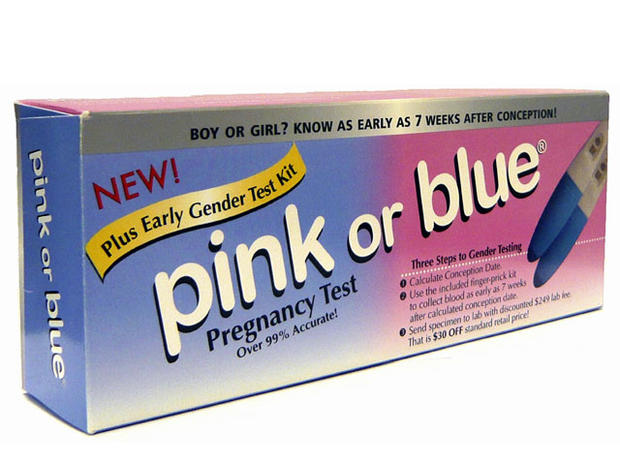Blood tests to predict baby's gender shown to work: Will abortion rate soar?
(CBS/AP) Is it a boy? New research suggests widely available blood tests that predict gender actually work - and well. How well? Well enough that expecting parents can start painting the nursery and picking out baby outfits more than seven months before they're born.
For years gender-detecting blood tests have been sold online to consumers but U.S. doctors don't dole them out regularly. So Tufts University researchers wanted to find out if they actually worked.
For the study - published in the August 10 issue of the Journal of the American Medical Association - researchers analyzed 57 published studies of gender testing that involved more than 6,000 pregnancies. Tests that companies sell directly to consumers were not examined in the analysis, but the researchers looked at a test called PCR that detects genetic material - in this case the male Y chromosome - in a mother's bloodstream. Most commercially sold tests use a similar method to detect a baby's gender, where a woman pricks her finger and sends blood droplets back to the manufacturer, who sends it to a lab for analysis.
They found the gender-predicting test is about 95 percent accurate when women are at least seven weeks' pregnant - more than one month before conventional tests like an amniocentesis or ultrasound. Sex-detection tests using mothers' urine or blood before seven weeks of pregnancy were not accurate, the researchers said.
The researchers say the results suggest blood tests like those studied could be a breakthrough for women at risk of having babies with sex-linked hereditary diseases, who could avoid invasive procedures if they learned their fetus was a gender not affected by those illnesses.
But the study raised concerns about couples using such tests for gender selection and abortion. Couples who buy tests should be questioned about how they plan to use the results, the researchers said.
Senior author Dr. Diana Bianchi, executive director of the Mother Infant Research Institute at Tufts Medical Center in Boston, called the results impressive. She said that British doctors already use such testing for couples at risk of having children with hemophilia or other sex-linked diseases to guide treatment.
But buyer beware - the research indicates that many labs have had success with the test, but can vary substantially across all labs, said Dr. Joe Leigh Simpson, a genetics professor at Florida International University, who was not involved in the research.
Dr. Lee Shulman, chief of clinical genetics at Northwestern Memorial Hospital in Chicago, said the testing "isn't ready for prime time." He said his hospital doesn't provide the blood tests or other gender-predicting techniques to women who have no medical reason for wanting to know their baby's gender.
"I would have a lot of difficulties offering such a test just for gender identification," Shulman said. "My concern is this is ultimately going to be available in malls or shopping centers."
If other countries are an indication, gender prediction can affect abortion rates. Recent research showed that increasing numbers of Indian women who already have daughters are having abortions when prenatal tests show another girl is on the way. Evidence also suggests China's limits on one child per couple and traditional preference for male heirs has contributed to abortions and a large gender imbalance. There's little data on reasons for U.S. abortions or whether gender-detection methods play a role.
Consumer Genetics Inc. a Santa Clara, Calif.-based company, sells a blood test called "Pink or Blue" online for $25 plus $265 or more for lab testing. Terry Carmichael, the company's executive vice president, said the company sells more than 1,000 kits a year but won't test blood samples unless women sign a consent form agreeing not to use the results for gender selection. The company also won't sell kits to customers in China or India because of gender selection fears, he said.
Other medical techniques that can detect gender include the invasive-needle amniocentesis procedure, usually done at around 16 weeks; chorionic villus sampling, done at around the 10th week to detect abnormalities by examining placenta tissue; and ultrasound, most accurate at around 13 weeks. The first two methods can slightly increase risks for miscarriages.
Should moms test the gender of their babies before birth?

